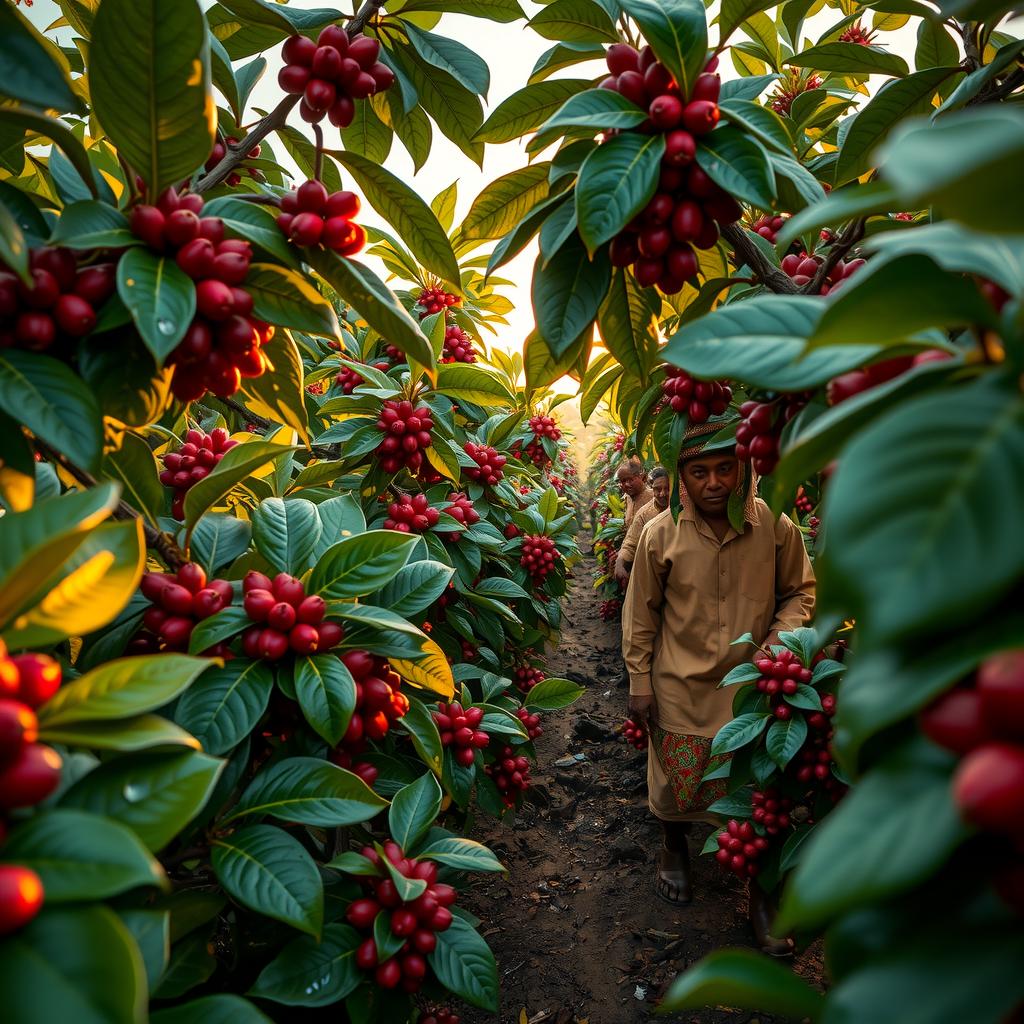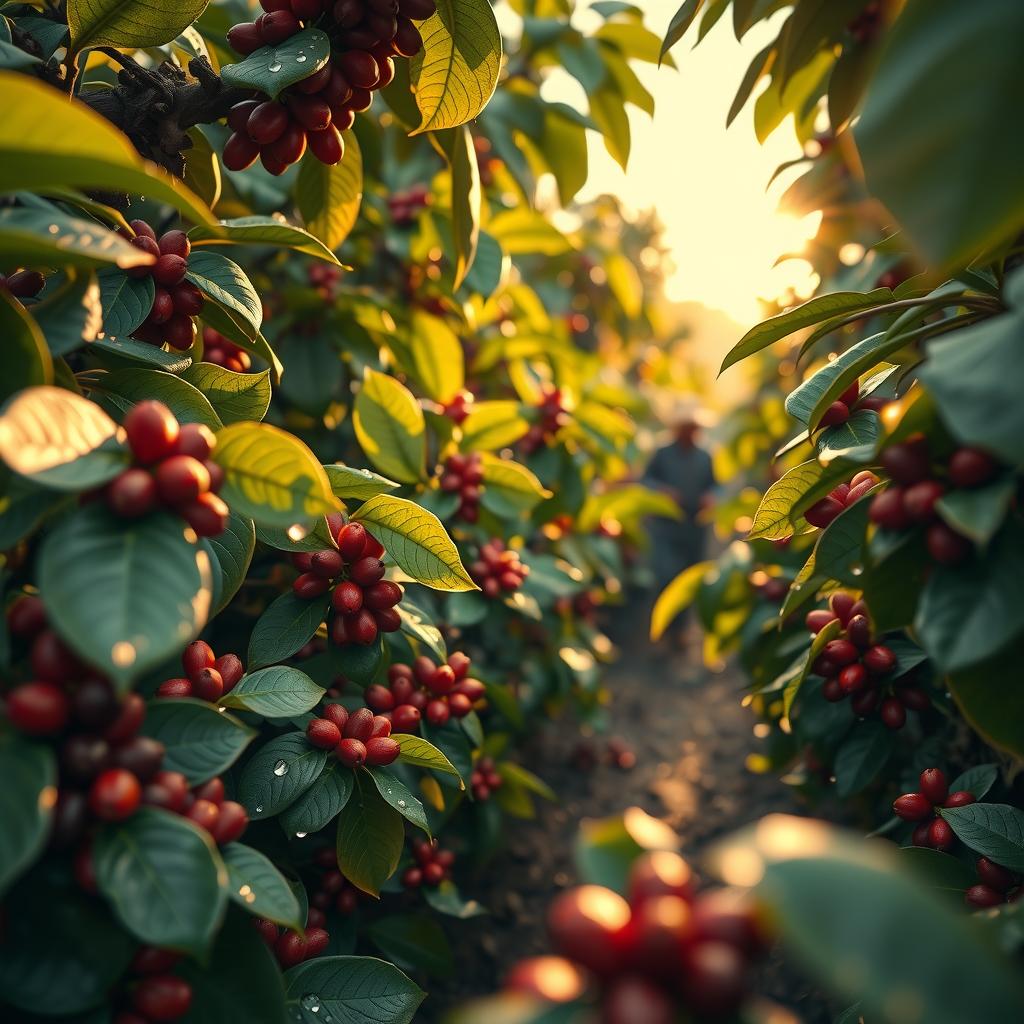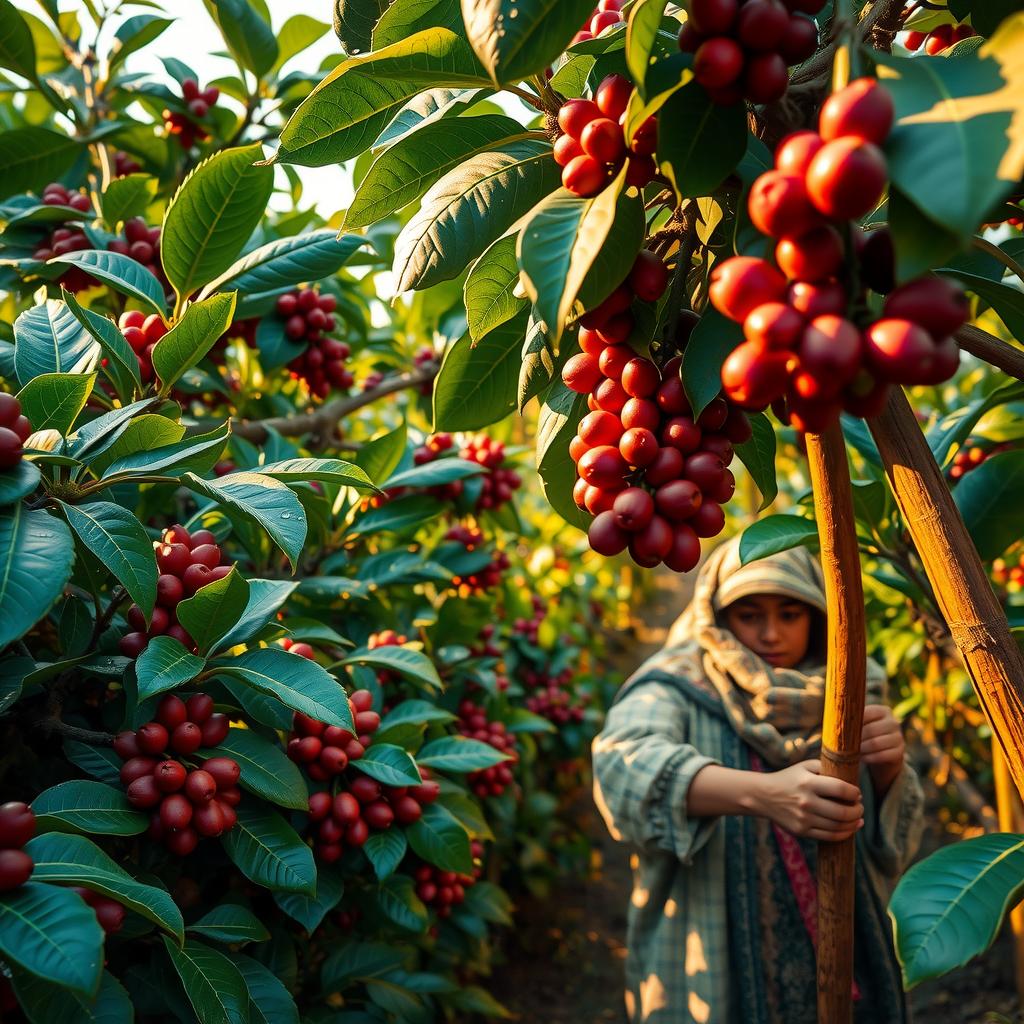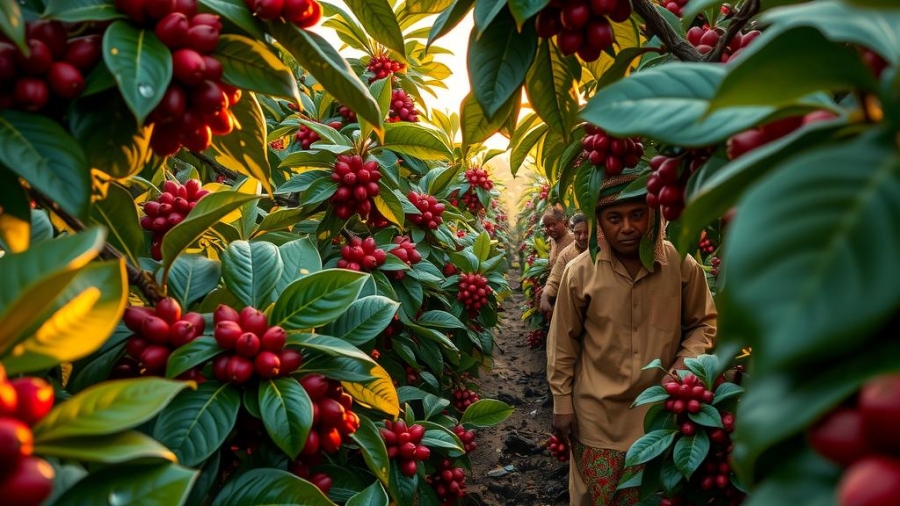In a world increasingly driven by consumer choices, the question of how coffee beans make their way from farm to cup has never been more relevant. With growing awareness about ethical sourcing and sustainable practices, many coffee lovers are now seeking out fair trade coffee beans as a means to support responsible farming communities while enjoying their daily brew. But what does it truly mean when a product carries the fair trade label? This guide aims to demystify the journey of fair trade coffee beans, shedding light on their significance in promoting social equity and environmental stewardship.
At its core, fair trade certification is not just a stamp on packaging; it represents a commitment to transparency within the supply chain and an assurance that farmers receive equitable compensation for their labor. For anyone interested in making informed purchasing decisions, understanding the principles behind fair trade can transform ordinary coffee sourcing into an act of empowerment for marginalized producers worldwide. Readers can expect insights into what constitutes ethical sourcing practices, highlighting why consumers should prioritize eco-friendly methods when choosing their next bag of beans.
As this blog post unfolds, it will provide practical tips on how to identify genuine fair trade coffee beans, ensuring that all buyers can contribute positively towards sustainable agriculture without compromising quality or taste. By exploring various aspects such as certification processes and supply chain transparency, readers will be equipped with knowledge that not only resonates personally but also connects them with larger global issues surrounding climate change and social justice.
Join us as we delve deeper into this essential topic—whether one is brewing at home or selecting options at cafes—each decision plays a role in fostering an environment where both people and planet thrive together through conscious consumption of fair trade coffee beans.

Key Points:
-
Understanding Fair Trade Certification: The significance of fair trade certification lies in its ability to ensure that consumers are purchasing products that genuinely support ethical practices. When selecting fair trade coffee beans, it is essential to look for the appropriate certifications on packaging, indicating adherence to established standards that promote responsible sourcing and equitable labor practices.
-
Traceability and Supply Chain Transparency: A core aspect of sustainable coffee production is supply chain transparency. By choosing fair trade coffee beans, consumers can trace their coffee back to the farms where these beans were cultivated. This traceability not only reassures them about the ethical treatment of farmers but also highlights the eco-friendly practices employed throughout the production process.
-
Identifying Reputable Suppliers: To make informed decisions while engaging in ethical sourcing, consumers must learn how to identify reputable suppliers dedicated to maintaining high standards of quality and fairness. Engaging with brands that prioritize both sustainability and social responsibility ensures that every purchase of fair trade coffee beans contributes positively toward community development and global sustainability efforts.

Understanding Sustainable Coffee: The Core Principles
The Essence of Sustainability in Coffee
Sustainable coffee encompasses more than just eco-friendly labels; it embodies a commitment to ethical sourcing and responsible agricultural practices. At the heart of sustainability is supply chain transparency, which ensures that every step, from farming to processing and distribution, adheres to standards that protect both people and the planet. When consumers choose fair trade coffee beans, they support farmers who receive equitable compensation for their labor, promoting better living conditions and community development. This practice not only aids in alleviating poverty but also fosters environmental stewardship by encouraging farmers to adopt eco-friendly practices such as organic farming methods, agroforestry, and biodiversity preservation.
Beyond Labels: What Truly Defines Sustainable Coffee
The journey towards understanding sustainable coffee requires looking beyond certifications like Fair Trade or Rainforest Alliance. While these labels are important indicators of ethical practices, true sustainability involves a holistic approach encompassing social equity, economic viability, and environmental health. For example, fair trade certification guarantees that producers adhere to specific standards regarding wages and working conditions; however, it is equally essential for brands to engage with their suppliers transparently throughout the entire coffee sourcing process. By establishing robust relationships with growers through direct trade models or transparent supply chains, companies can ensure they contribute positively to local economies while delivering high-quality products like fair trade coffee beans.
The Role of Ethical Sourcing in Sustainable Practices
Ethical sourcing plays a pivotal role in defining sustainable coffee by prioritizing fairness at every level of production. This means selecting partners committed not only to quality but also to humane treatment of workers across all stages—from cultivation on small farms through processing facilities—ensuring ethical labor practices are maintained consistently. As consumers become increasingly aware of their purchasing power’s impact on global communities, businesses must adapt by embracing responsible sourcing strategies that promote long-term partnerships with farmers dedicated to sustainable agricultural methods. Choosing products such as fair trade coffee beans reflects an informed decision-making process where individuals actively contribute toward creating a more equitable world.
Transparency: Key Ingredient for Trustworthy Supply Chains
Transparency within the supply chain serves as an essential pillar supporting sustainable coffee initiatives by fostering consumer trust and accountability among stakeholders involved in production processes. A clear view into how coffee beans are grown nurtures confidence among buyers who seek assurance about product integrity—from its origins at family-owned farms nestled in mountainous regions down through each stage until it reaches cafes worldwide. Additionally, enhanced visibility allows companies committed to eco-friendly practices not only showcase green initiatives but also track progress over time against established benchmarks related to social responsibility—further elevating their brand reputation amidst growing competition within the specialty market niche defined largely by conscious consumerism trends surrounding ethically sourced goods.
Building Connections Through Education on Sustainable Choices
Educating consumers about what constitutes truly sustainable options empowers them during purchasing decisions while enhancing overall appreciation for complex factors influencing global agriculture systems linked closely with products like fair trade coffee beans derived from conscientious growers invested deeply into improving livelihoods sustainably without compromising natural ecosystems around them—their resource base upon which success hinges ultimately rests! As awareness continues expanding regarding challenges faced across different regions producing this cherished beverage globally—such as climate change effects threatening yields—it becomes evident why choosing sustainably sourced coffees represents one vital avenue forward toward cultivating resilience rooted firmly within our interconnected world today!

The Importance of Fair Trade Certification: Supporting Farmers and Planet
Empowering Communities Through Ethical Sourcing
Fair trade certification plays a crucial role in promoting responsible sourcing practices, significantly benefiting farmers and communities across the globe. By ensuring that producers receive fair wages for their labor, fair trade coffee beans exemplify how ethical sourcing can uplift entire communities. This approach not only fosters economic stability but also encourages sustainable farming methods that protect the environment. For instance, certified coffee growers are often trained in eco-friendly practices that mitigate deforestation and promote biodiversity, contributing to healthier ecosystems. Moreover, fair trade standards advocate for supply chain transparency; consumers can feel confident knowing where their products come from and how they are produced. As they choose fair trade coffee beans, individuals support a system that prioritizes social justice and environmental stewardship.
Building Sustainable Futures
In addition to economic benefits, fair trade certification enhances community development through educational opportunities funded by premium prices paid for certified goods. Producers of fair trade coffee beans often see additional investments made into local infrastructure such as schools or healthcare facilities due to the financial security provided by this model of ethical sourcing. Such initiatives not only improve quality of life but also empower farmers with knowledge about sustainable agricultural techniques which further enriches their farming practices over time.
A Global Movement Towards Transparency
The movement towards responsible sourcing has seen significant growth as consumers become more conscious of their purchasing decisions. More than ever before, people seek out products like fair trade coffee beans because they understand the impact these choices have on global markets and local livelihoods. Fair trade certification ensures compliance with rigorous social and environmental criteria designed to uphold worker rights while promoting sustainable agriculture—elements crucial in today’s commercial landscape where customers demand accountability from brands.
Enhancing Consumer Awareness
As awareness increases surrounding the importance of supporting ethically sourced products like fair trade coffee beans, companies must commit to transparency within their supply chains too; this is essential for building trust with informed consumers who prioritize sustainability in their buying habits. In doing so, businesses create a powerful synergy between profit-making endeavors and community welfare—a dynamic that ultimately benefits both sides while fostering an environmentally-conscious marketplace committed to preserving our planet’s resources for future generations.
Through understanding the multifaceted advantages associated with fair trade certification—ranging from improved income levels among farmers to enhanced environmental practices—the collective impact on communities worldwide becomes evident: it is indeed possible to consume responsibly without compromising ethical values or planetary health.
Practical Tips for Ethical Coffee Sourcing
Understanding Supplier Ethics in Coffee Production
When it comes to sourcing coffee, establishing a connection with suppliers who prioritize ethical standards is paramount. Assessing potential partners requires a keen understanding of various factors that contribute to responsible sourcing. One essential criterion is the presence of fair trade certification—a hallmark of suppliers committed to equitable relationships with farmers and sustainable practices. Suppliers who offer fair trade coffee beans often ensure that producers receive fair compensation, thereby encouraging community development and environmental stewardship. Furthermore, transparency within the supply chain should be scrutinized; reputable suppliers provide clear documentation regarding their sourcing methods and labor conditions. This leads to greater trust between consumers and producers while fostering eco-friendly practices that benefit both parties.
Evaluating Sustainability Practices
Sustainability plays an integral role in ethical coffee sourcing, as it encompasses not only economic fairness but also environmental integrity. To find reliable suppliers, one should assess their commitment to organic farming techniques or shade-grown cultivation methods that preserve biodiversity. Suppliers offering sustainable coffee options typically engage in practices such as reducing pesticide usage or conserving water resources—a true reflection of their dedication toward protecting our planet’s ecosystems. Additionally, these providers often support initiatives aimed at reforestation or soil health improvement within coffee-producing regions, demonstrating a holistic approach to sustainability beyond mere profitability.
Ensuring Community Impact through Responsible Sourcing
The impact on local communities remains crucial when evaluating potential coffee suppliers for ethical sourcing efforts. It is beneficial to identify those who actively participate in community-building activities or invest back into the areas they source from; this may include educational programs for farmers’ children or healthcare initiatives supporting workers’ families involved in growing fair trade coffee beans. A supplier’s involvement can significantly influence the quality of life for those engaged along the supply chain while simultaneously enhancing product quality through better-supported labor forces. By choosing partners aligning with these values, companies can help amplify positive changes across global communities reliant upon this vital agricultural sector whilst promoting social responsibility among consumers seeking ethically sourced products.
The Ultimate Guide to Sourcing Fair Trade Coffee Beans: A Sustainable Choice for Conscious Consumers
In today’s marketplace, where ethical consumption is gaining momentum, the importance of sourcing fair trade coffee beans cannot be overstated. This guide emphasizes that transparent supply chains are crucial for conscious consumers who wish to support both farmers and the environment. To truly understand sustainable coffee, one must look beyond labels; it requires a deep commitment to responsible sourcing practices that empower communities.
Understanding Sustainable Coffee
At its core, sustainable coffee production encompasses various elements that contribute to environmental health and social equity. When selecting fair trade coffee beans, consumers engage in a practice that transcends mere purchasing; they actively participate in promoting equitable labor conditions and ensuring fair wages for growers. By choosing ethically sourced options, individuals can enjoy their morning brew while supporting farming communities striving for economic stability.
The Role of Fair Trade Certification
One pivotal aspect of this journey involves understanding fair trade certification. This certification serves as an assurance that certain standards have been met regarding ethical labor practices and environmentally friendly cultivation methods. When consumers opt for certified products such as fair trade coffee beans, they receive not only high-quality flavors but also peace of mind knowing their purchase contributes positively toward global sustainability efforts.
Identifying Reputable Suppliers
Navigating the world of ethical sourcing can be daunting without proper guidance on identifying reputable suppliers dedicated to fair practices. To ensure accountability in the sourcing process, it’s essential to research potential partners thoroughly. Look for companies committed to upholding stringent fair trade standards and showcasing transparency throughout their supply chain operations. By doing so, consumers can confidently choose brands offering quality products like fair trade coffee beans, which promote eco-friendly practices alongside delicious taste experiences.
FAQ:
Q: What does fair trade certification mean?
A: Fair trade certification indicates that certain social, economic, and environmental standards have been met by producers in developing countries; ensuring better trading conditions and sustainable farming practices.
Q: How do I know if my coffee is sustainably sourced?
A: Look for certifications such as Fair Trade or Rainforest Alliance on packaging; these labels indicate adherence to responsible sourcing criteria aimed at protecting farmers’ rights and promoting ecological balance.
Q: Why should I choose fair trade over regular coffee?
A: Choosing fair trade supports small-scale farmers by providing them with better prices and working conditions while encouraging sustainable agricultural methods—ultimately benefiting both people and the planet.
